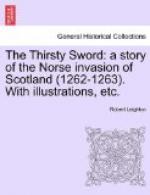In a little time they had landed and mounted to the castle gates, where the lord warden met them and bade them enter. They gave up their weapons, and Kenric delivered his two hawks to the falconer. So when the warden had offered them all drink and food, he asked Sir Piers de Currie how it was that Earl Hamish of Bute had not accompanied him.
“Alas! he is dead,” said the knight, telling of the treachery of Roderic.
“Woe, woe!” cried the old warden with tears in his eyes. “But this is surely the saddest thing that could have befallen, and a sorry blow for our country. And this is his son, eh? By the rood, a well-favoured youth, and a strong. Heaven grant that he prove as good and leal a man as his father before him!” and he rested his hand on Kenric’s shoulder.
“And now, what of his Majesty the King?” asked Sir Piers.
“He comes from Stirling even now,” said the warden, “and will be here at sunset. But ’tis a wearing ride from Stirling to Dumbarton, Sir Piers, and it may be you will not have audience with his Majesty ere morning. So bring in your shipmen, my lord of Bute, for methinks there will be rain tonight, and a cosy chamber in the castle were better lodging than an open boat. Doubtless, too, our own men-at-arms will welcome your retainers for the story they have to tell of this sad happening in Bute.”
Accordingly the crew of Kenric’s ship were brought within the castle, and with the men of Dumbarton and the bodyguard of the king they formed a merry company in the guardroom, while Kenric and his two companions remained as guests of the lord warden.
At the moment when the sun was sinking in the golden west, the King of Scotland arrived, accompanied by Queen Margaret and their attendants; but, as the warden had said, there could be no audience that night.
CHAPTER XVI. KENRIC BEFORE KING ALEXANDER.
Before a bright fire in the great audience chamber of Dumbarton Castle sat King Alexander the Third. By his side stood two youthful pages, one a lad of sixteen or so, whose delicate complexion and habit of dress proclaimed him to be English; the other a lad of perhaps the same age, whose clear blue eyes, flaxen hair, and ruddy cheeks betokened northern blood. Sitting apart were the King’s justiciary and the sheriff of Dumbarton. At the far end of the hall at either side of the portal stood two Highlanders, armed with drawn swords.
The king, now at the age of three-and-twenty, was dressed in a long robe of brown velvet, trimmed with fur. He wore a heavy chain of gold about his neck, with the device of the thistle resting on his jerkin of purple silk. The jewelled haft of a dagger was seen in his belt of crimson leather, and a long sword hung at his left side. His long thin legs were clothed in tight-fitting hose, and his feet — which were, perhaps, over large — were furnished with warm slippers lined with fur. He sat with his legs stretched out before him, and with his hands clasped behind his head.




